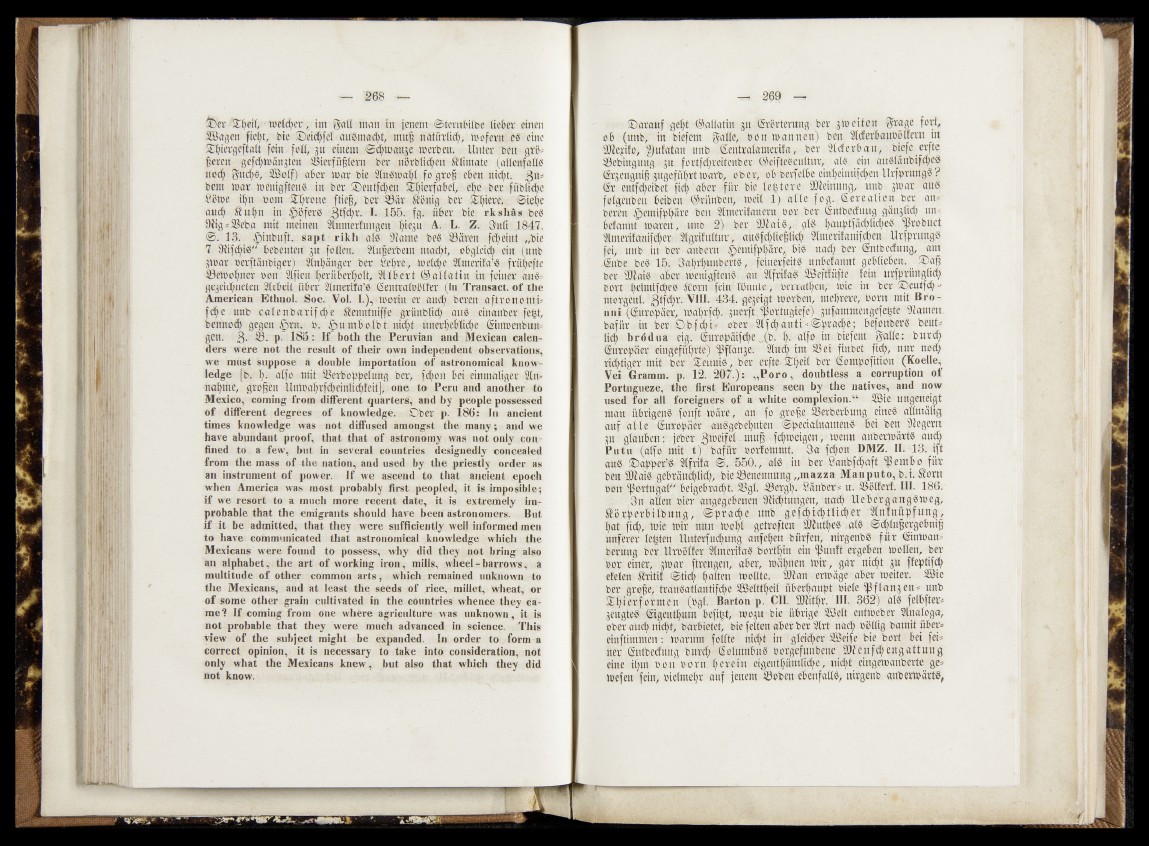
© er ©peil, it>efd;er, im gall man in jenem @ternbilbe lieber einen
SBkgen fie£>t, bie ©eicpfel auSmad;t, muß natürlich, mo fern cS eine
©piergeftalt fein foil, 31t einem @d;toanze toerben. Unter ben größeren
gefcptoänzteu Vierfüßlern ber ttörblid;en Climate (allenfalls
nod; $ucps, Sßolf) ober mar bie 2luStoapl fo groß eben tticpt. &\\*
bem mar toenigftenS in ber ©eutfd;eu ©pierfabel, epe ber füblidje
Öötoe ipit oorn ©prone fließ, ber 2Bär Sottig ber Süßere, <3iepe
aucp ® u pn in |jöferS $tfcp;e. I. 155. fg. über bie rksliäs beS
9lig*23eba mit meinen 2Ittmerfungen Ißeju A. L. Z. 3n(i 1847.
@. 13. ^)inbnft. sapt rikh als Starne beS 23äreti fdjeiut „bie
7 DlifcpiS" bebenten ju follen. Slußerbem mad;t, obgleid; ein (unb
3mor berftönbiger) 2lttpänger ber Sepre, to cid; e 2lmerifa,S fritpefte
Vetooptier bon 2lficu perüberpolt, 2llb e r t (S a lla tin in feiner aus*
gezeichneten Slrbeit über 2lnterifa’S (Seutraloölfer (in Transact, of the
American Ethnol. Soe. Vol. I.), tooriu er and; bereu aftronom i*
ftpe unb c a le n b a rifd ;e Senntniffe gritnblid; aus einauber feist,
bennocp gegen £>rn. b. ^ u m b o l b t nicht unerhebliche (Siittoenbun*
gen. 3. V. p. 185: If both the Peruvian and Mexican calenders
were not the result of their own independent observations,
we must suppose a double importation of astronomical knowledge
[b. p. nffc mit 23erboppelung ber, fd;oit bei einmaliger 2ln*
nähme, großen Untoaprfd;einlicpfeit], one to Peru and another to
Mexico, coming from different quarters, and by people possessed
of different degrees of knowledge. Dber p. 186: In ancient
times knowledge was not diffused amongst the many; and we
have abundant proof, that that of astronomy was not only confined
to a few, but in several countries designedly concealed
from the mass of the nation, and used by the priestly order as
an instrument of power. If we ascend to that ancient epoch
when America was most probably first peopled, it is imposible;
if we resort to a much more recent date, it is extremely improbable
that the emigrants should have been astronomers. But
if it be admitted, that they were sufficiently well informed men
to have communicated that astronomical knowledge which the
Mexicans were found to possess, why did they not bring also
an alphabet, the art of working iron, mills, wheel - barrows, a
multitude of other common arts, which remained unknown to
the Mexicans, and at least the seeds of rice, millet, wheat, or
of some other grain cultivated in the countries whence they came
"i If coming from one where agriculture was unknown, it is
not probable that they were much advanced in science. This
view of the subject might be expanded. In order to form a
correct opinion, it is necessary to take into consideration, not
only what the Mexicans knew, but also that which they did
not know.
darauf gef;t (Pallatin 31t (Erörterung ber 310eiten $rage fort,
ob (ttttb, in biefern f^alle, oon toauuen) ben 2lderbauoölfern in
Sftejifo, ?)itfatait unb (Eentralamerifa, ber 21 cferb a it, biefeer|te
töebingitng 31t fortfdjreitcnber ©eiftescultur, als ein auSlänbtfcpeS
(Erjeugniß zugefitprt toarb, ober, ob bevfelbe eittpeimifcpeu UrfpntngS ?
(Er entfcpeibet fiel; aber für bie letztere Meinung, unb ztoar auS
folgenbett beiben ©ritnben, toeil 1) alle fog. (Eereatien ber an*
bereu .^emifppäre ben 2lmerifanern bor ber (Eutbeduug gänglict; un*.
befannt toarett, uud 2) ber iülais, als pauptfäcplicpeS fßrobuct
2Unertfanifd;er 2lgrifuttur, auSftplteßltd; 2lmerifanifd;en Urfprung«
fei, unb in ber anbern ^emifppäre,, bis nad; ber (Sntbeduitg, am
(Enbe beS 15. 3aprpuubcrtS, feiuerfeitS unbefannt geblieben, ©aß
ber Sftais aber toenigftenS an 2lfrifaS SSBeftfüfte fein ttrfprüuglicp
bort peitnifepes Jsöortt fein fönnte, oerratpen, toie itt ber ©cutfep *
morgenl. 3tfd;r. VIII. 434. gezeigt toorben, mehrere, oorn mit Bro-
nni ((Europäer, toaprfd;. gnerft ißortugiefe) zufammengefepte tarnen,
bafitr in ber ©bfcpi* ober 21 fcf)anti*Sprache; befonberS beut*
liep brödua eig. (Suropäifcbe .^(b. p. alfo in biefern Salle: bnrd;
Europäer eittgefitprie) Pflanze. 2lucp im 23 ei finbet ftd;, nur notp
rieptiger mit ber ©ettuis, ber erfte ©peil ber (Eompofition (Koelle,
Vei Gramm, p. 12. 207.): „Poro, doubtless a corruption of
Portugueze, the first Europeans seen by the natives, and now
used for all foreigners of a white oomplexion.“ 2Sie ungeneigt
matt übrigens fonft toäre, an fo große Verberbttng eines adntätig
auf a lle Europäer auSgebepnteit @pecialnamenS bei ben Siegern
31t glauben: jeber gtoeifel muß fepmeigen, trenn anberloärtS aud;
Putu (alfo mit t) bafür oorfommt. 3 a fepon DMZ. II. 13. ift
aus ©apper’S 2ffrifa @. 5 5 0 ., als itt ber 8anbfd;aft ißembo für
ben SJlaiS gebräucplicp, bie Benennung „mazza Manputo, b.i. $ortt
oon ißortugal" beigebratpt. 23gl. töergp. Öättber* u. 23ölferf. III. 186.
3n allen oier angegebenen 3M;tungen, ttaep U ebergangS toeg ,
t ö r p e r b i l b u n g , © p raep e unb gefepiepttieper 2lnfn üpfu ng_,
pat fiep, toie toir nun toopl getroffen SUutpeS als ©cplußergebniß
unferer tepten Uuterfucpung anfepett bürfett, nirgenbS fü r (Eintoait*
berung ber Uroölfer 2fmerifaS bortpitt ein Vitnft ergeben toollen, ber
oor einer, gtoar ftrengen, aber, toäpnen toir, gär niept 3U ffeptifcp
efelen tritif @ticp palten toollte. SJtan ertoäge aber_ toeiter. 2Bie
ber große, trauSatlantifipe 2S3elttpeit überpanpt oiele P fla n z e n * unb
© p ie rfo rm e n (bgl. Barton p. CII. üDlitpr. III. 362) als felbfter*
ZeitgteS (Eigetttpum beftpt, 10031t bie übrige 2ßelt enttoeber Analoga,
ober amp niept, barbietet, bie feiten aber ber 2frt najp öölfig bamitüber*
einftimmen: toarum folfte niept in gleicher Söeife bie bort bei fei*
ner (Entbed'ttng burd; (SolttmbuS oorgefuttbene S ilettfep en g attu itg
eine ipttt oon o o rn p ere in eigentpümlitpe, itid;t eingetoanberte ge*
toefen fein, oielmepr auf jenem Sßobett ebenfalls, nirgenb anbertoärts,
ir